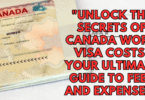Are you planning to work in Canada?
If so, you may be wondering how long it takes to get a work visa.
The processing time can vary depending on several factors, and it is essential to have all the information before you start the application process.
Canada is known for its welcoming attitude towards immigrants, and it is no surprise that many people choose to work and live in the country.


However, the visa application process can be a bit overwhelming, especially if you are not familiar with the requirements and procedures.
If you are considering applying for a work visa in Canada, it is crucial to understand the processing time and what factors can affect it.
In this article, we will provide you with all the information you need to know about Canada work visa processing time, so you can plan accordingly and avoid any unnecessary delays.
What is a Work Visa?
A work visa is a type of document that allows foreign nationals to work temporarily in a foreign country, with Canada being no exception.
It is issued to applicants who can demonstrate that they have a valid job offer and occupation that is approved by the government to work in Canada for a certain period of time.
The work visa can be issued for a period of 1 year or more, depending on the type of application and other personal circumstances of the applicant.
In general, the application process takes some time, and there are specific guidelines and requirements that the applicants need to fulfill in order to be eligible for the work visa.
What is Processing Time for a Canadian Work Visa?
The duration required to process Canadian work visas may differ based on the specific application type. It is crucial to regularly check the processing times and allow ample time for visa application before making travel arrangements.
The processing times for various Canadian work visas are regularly revised, and it is important to stay informed about any updates. The application process for a Canadian work visa can takes some time, so applicants need to be patient throughout the process.
To prevent any disappointment, it is essential to stay informed and updated on any unforeseen delays and stay informed.
Understanding the time frame involved in getting a work permit is critical for any individual planning to work in Canada. Therefore, applicants should be patient and well-informed on any updates regarding processing times.
This approach will allow them to plan adequately and avoid any last-minute frustration or disappointment. Whether it is an application for a temporary or permanent work permit or simply a renewal of an existing permit, being aware of the processing times is crucial.
Therefore, check the official documentation regularly and ensure that you allocate enough time before your intended travel date for your visa application.
Types of Canadian Work Visas
When considering employment opportunities in Canada, there are various work visa options available to foreign individuals.
Each visa type has its own unique prerequisites and processing durations, making it vital to comprehend the most suitable choice based on individual circumstances.
This article will provide an overview of the various Canadian work visas, their eligibility criteria, the process of application, and the time required for processing.

best health insurance in Canada

Cultural Exchange Programs in Vancouver: A Comprehensive Guide
Temporary Foreign Worker Program (TFWP)
The Temporary Foreign Worker Program (TFWP) is a program intended for foreign nationals who wish to work in Canada on a temporary basis. The program is administered by the federal government and provides a means for employers to fill labor shortages in certain industries.
There are two streams in the TFWP: The High-Wage Stream and the Low-Wage Stream. Each stream has unique eligibility criteria and is intended for different types of employment.
The program differs from other work permits in that it requires a Labour Market Impact Assessment (LMIA) from Employment and Social Development Canada (ESDC) to confirm that there is a need for a temporary foreign worker.
To apply for the program, applicants must provide a complete application, including the necessary documents and a processing fee.
To qualify for the TFWP, applicants must meet certain eligibility criteria, including having a valid job offer from a Canadian employer, meeting specific education and work experience requirements, and demonstrating their ability to support themselves financially during their stay in Canada.
The program has two streams, the High-Wage Stream and the Low-Wage Stream, which differ mainly in terms of hourly wage and location. Applicants must provide a number of documents as part of their application, including a LMIA from ESDC, a valid passport or travel document, proof of language proficiency, and evidence of funds to support themselves and their family members in Canada.
Processing times for the program can vary widely and depend on factors such as the location of the application and the volume of applications being processed.
Applicants should be prepared to provide additional information or documentation if requested and should be aware that a successful application may result in a temporary work permit or a refusal.
International Mobility Program (IMP)
The International Mobility Program (IMP) is a program designed by the Canadian government to allow foreign nationals to work in Canada for a specific period.
This program applies to those who are not Canadian citizens or permanent residents but are interested in working or acquiring work experience in Canada. The IMP includes a wide range of work visas, which provide temporary Canadian work permits and enable foreign nationals to work and live in Canada temporarily.
The IMP permits a broad range of work visas that are designed to facilitate the entry and employment of foreign nationals to work in Canada, depending on their personal circumstances. These visas are classified into several categories, including working holiday visas, intra-company transfers, global talent-stream work visas, and spousal work permits, among others.
Eligible individuals can apply for work visas under the IMP, and the processing time is usually shorter than that of other visa application types. Applicants can also receive an approval letter, which can be used to cross the Canadian border at the port of entry.
Overall, the IMP is an excellent opportunity for foreign nationals to gain work experience, travel, and live in Canada while expanding their potential job opportunities.
Self-Employed Persons Program (SEPP)
The Self-Employed Persons Program (SEPP) is a Canadian immigration program designed for individuals who are self-employed and wish to move to Canada permanently.
To be eligible, applicants must possess relevant experience in cultural or athletic activities or have experience in managing a farm.
Additionally, they must be able to demonstrate their intention and ability to become self-employed in Canada, as well as pass a medical exam and security background check.
The application process for the SEPP involves the submission of various forms and fees. Applicants must provide detailed information about their work experience, education, and financial status.
Additionally, they must provide documents such as a business plan, portfolio, and evidence of relevant experience. The processing time can vary depending on the individual circumstances of each applicant.
However, once the applicant meets specific criteria and has been in the country for a minimum of two years, they may be eligible to apply for permanent residency, which is one advantage of the SEPP program.
Post-Graduate Work Permit (PGWP)
The Post-Graduate Work Permit (PGWP) program is a popular program for international students in Canada. It allows eligible graduates to stay and work in Canada for up to three years after completing their studies.
To be eligible for the PGWP, students must have completed a full-time program at a participating Canadian post-secondary institution that is at least eight months long.
They must also have graduated from a designated learning institution and have a valid study permit when applying for the PGWP.
The application process for the PGWP involves completing an online application and providing supporting documents, such as a letter of completion from their institution and a valid passport.
The processing time for the PGWP varies, but most applications are processed within approximately 99 days.
The key benefit of the PGWP is that it allows graduates to gain valuable Canadian work experience, which can help them qualify for permanent residency in Canada through the Canadian Experience Class or other immigration programs.
In summary, Canada’s Post-Graduation Work Permit Program (PGWPP) is an excellent opportunity for eligible international students to gain valuable Canadian work experience.
To apply for the PGWP, students must meet the eligibility requirements, complete the application process, and provide supporting documents. The processing time for the PGWP varies, but most applications are processed within approximately 99 days.
Overall, the PGWP is a great way for graduates to launch their careers in Canada and contribute to the Canadian workforce.
Open Work Permit (OWP)
The Open Work Permit (OWP) is a type of work permit that allows foreign workers to work for any employer in Canada. Unlike other types of Canadian work visas that are employer-specific, an OWP offers the freedom to work with any employer, anywhere in Canada.
An OWP is typically issued to eligible foreign nationals who are on select visa categories, such as international graduates, individuals with a valid spouse or common-law partner study or work permit, and certain refugee claimants.
The eligibility requirements for an Open Work Permit vary, but generally, an individual must be eligible to work in Canada and meet the criteria for one of the applicable permits.
The benefits of having an OWP cannot be overstated, as it offers a lot of flexibility and freedom to foreign workers. Examples of situations where an Open Work Permit might be the best option for a foreign worker include when an individual has completed their studies in Canada and wants to gain Canadian work experience, or when a worker wants to improve their language skills in a Canadian work setting.
Overall, an Open Work Permit can be an excellent option for individuals who want to gain valuable work experience in Canada with the flexibility to work for any employer.
Working Holiday Visa
The Working Holiday Visa presents an excellent chance for individuals who are looking to travel and acquire professional experience in Canada. This visa option is accessible to citizens of countries with bilateral agreements with Canada, who are within the age range of 18 to 35 years.
The Working Holiday Visa afford individuals the opportunity to work for any employer in Canada for a duration of up to 12 months.
Besides gaining valuable work experience, this visa facilitates exploration of Canada’s offerings and develop a distinctive understanding of the Canadian culture.
To be eligible for the Working Holiday Visa, individuals must meet several criteria, including having a valid passport, demonstrating that they have adequate financial resources to cover their expenses while in Canada, and obtaining health insurance for the duration of their stay.


In addition, individuals must not have previously obtained a Working Holiday Visa, must not be traveling with dependents, and must not have a criminal record.
Overall, the Working Holiday Visa is an excellent opportunity for individuals who are looking to travel and work in Canada for up to 12 months while gaining valuable work experience.
Spousal/Common-Law Partner Open Work Permit
A Spousal/Common-Law Partner Open Work Permit is a type of work permit that allows the spouse or common-law partner of a temporary foreign worker or international student to work while their partner is studying or working in Canada.
This type of permit is a great option for those who want to stay and work in the country while their partner pursues their goals.
To be eligible for a Spousal/Common-Law Partner Open Work Permit, the applicant must provide proof of their relationship to their partner, as well as their partner’s status in Canada.
To apply for a Spousal/Common-Law Partner Open Work Permit, the applicant must provide a complete and accurate application, along with all necessary documentation.
This documentation includes proof of their relationship (such as a marriage certificate or common-law partnership declaration) and their partner’s status in Canada (such as a study or work permit).
The application process may vary depending on whether the applicant is applying from inside or outside of Canada, but generally involves submitting the application and paying the necessary fees.
Those who are eligible for this type of work permit should definitely consider applying, as it can offer many opportunities for both the individual and their partner.

What is the Easiest Way to Immigrate to Canada?

Understanding Canada Visa Regulations: A Comprehensive Guide
Understanding the Application Process
The Canadian work visa application process is complex and requires careful attention to detail. Whether you are seeking a temporary or permanent work visa, understanding the process and steps involved is crucial.
The application process involves multiple stages, beginning with determining your eligibility and submitting a complete application with all required documents.
In this article, we will discuss the different stages of the application process, and common requirements, and provide tips to help you navigate the complex process with ease.
In conclusion, the Canada work visa processing time can be a daunting aspect of the immigration process, but with the right preparation and guidance,
it can be a smooth and successful experience. Remember to stay informed, follow the guidelines, and be patient.
Canada is waiting for you!


